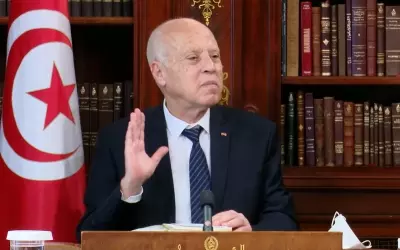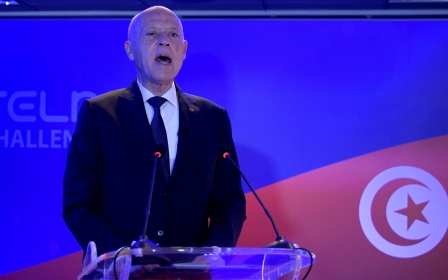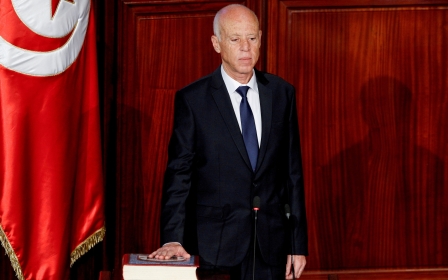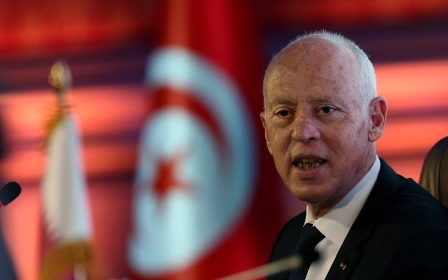Tunisia coup: Opposition MPs decry ‘retaliatory’ military tribunal
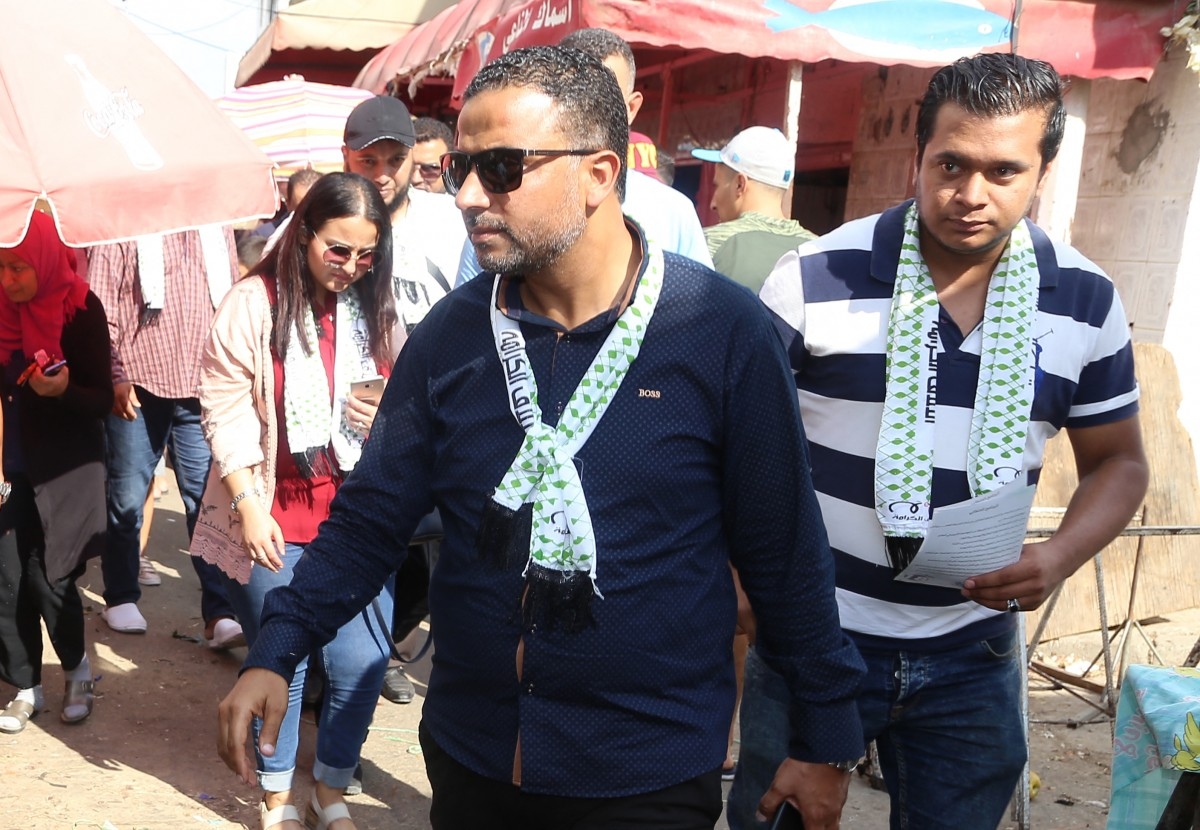
The leader of the fourth-largest bloc in the suspended Tunisian parliament has accused President Kais Saied of using the military judiciary to crack down on MPs who opposed his July power grab.
Seifeddine Makhlouf, head of the Dignity Coalition, is currently in hiding in Tunisia, along with two other MPs Nidhal Saoudi and Mohamed Affes, fearing they will be detained as part of a military investigation.
The case dates back to 15 March, when a Tunisian woman was arbitrarily barred from travel at Tunis' Carthage Airport, Makhlouf told Middle East Eye.
The woman reached out to lawyer Mehdi Zaghrouba and members of the Dignity Coalition seeking help to be reunited with her children, who were allowed to travel on the same day, leaving her behind at the airport without explanation by authorities. The woman was eventually allowed to travel, but the MPs and the lawyer have since been the target of several investigations.
'Members of the Dignity Coalition have been the most outspoken against Saied’s coup, and I have personally called for Saied’s prosecution over his violation of the constitution'
- Seifeddine Makhouf, head of the Dignity Coalition
Makhlouf and Saoudi, while at the airport, reached out to the interior ministry to report the incident. Hours later, a police force was sent to the airport and allegedly verbally assaulted the MPs present, including Makhlouf, Saoudi, Ahmed Ben Ayed, Maher Zid and Abdellatif Aloui, all members of Dignity.
New MEE newsletter: Jerusalem Dispatch
Sign up to get the latest insights and analysis on Israel-Palestine, alongside Turkey Unpacked and other MEE newsletters
Following the altercation, the police officers filed a lawsuit before a civilian court accusing the MPs of assaulting them in the airport.
The case remained in the investigations phase with the civilian judiciary until 25 July, the day when Saied dramatically removed the prime minister, suspended parliament and lifted the immunity of all MPs, paving the way for their prosecution.
The presidential measures were denounced by the majority of political forces as “a constitutional coup” and have plunged the country into further political and economic turmoil.
“Five minutes after midnight on 25 July, security officials filed a new case, this time with a military court,” Makhlouf told MEE, adding that Tunisia's constitution does not allow for hearing two cases in front of two different courts. The original court is the only one adequate to hear the case, he said.
An appeals court is due to decide on Wednesday whether the case should go back to civilian judiciary.
According to the summons warrant shared with MEE, the charges brought against Makhlouf and his fellow MPs include: "leading a conspiracy against internal state security with the purpose of changing the character of the state, inciting the population against each other to provoke an armed civil strife, and threatening officials with violence and preventing them from carrying out their duties".
Lawyer Mehdi Zaghrouba, who is not affiliated with Dignity, is also facing the same charges in a military court, and has been jailed since 2 September in Tunisia's Mornaguia prison. Zaghrouba's prosecution has triggered solidarity protests by lawyers, who have threatened a general strike if his case is not withdrawn from the military court.
He described the new military investigation as “a retaliatory measure” by Saied, who has also seized vast judicial powers since July, assuming the position of the public prosecutor.
“Members of the Dignity Coalition have been the most outspoken against Saied’s coup, and I have personally called for Saied’s prosecution over his violation of the constitution,” Makhlouf said.
He explained that the military judiciary in Tunisia is an exceptional judiciary, controlled by the defence minister. The defence minister has also been sacked by Saied, which gave the president increased powers over the military judiciary.
'A threat to the state'
Seven weeks after his controversial power grab, Saied has yet to address the fears of his critics. He has not named a new prime minister or declared his plan for governance. He has criticised parliament as an institution that represents a “threat to the state,” and said he would amend the constitution.
Saied’s moves have been criticised by Human Rights Watch as “arbitrary and politically motivated acts of repression”.
Since 25 July, HRW said three MPs have been imprisoned in connection with free speech offences, at least 50 people have been placed under arbitrary house arrests, and dozens have faced travel bans
Since 25 July, HRW said three MPs have been imprisoned in connection with free speech offences, at least 50 people have been placed under arbitrary house arrests, and dozens have faced travel bans.
At least 10 lawmakers have been subject to investigations since Saied’s announcement, four of whom are in custody.
Meanwhile, Saied is facing local and international calls to restore democratic rule. Last week, the G7 group of advanced economies urged him to appoint a new head of government and "return to a constitutional order".
Saied's planned power grab was first revealed by Middle East Eye in May, when a secret document was being circulated recommending the president invoke Article 80 of the constitution and seize control of the country, citing emergency powers.
Saied did exactly that in July, saying the coronavirus pandemic and the economic situation had become so dire that he needed to freeze parliament and dismiss the government, as well as launch an anti-corruption drive.
Hichem Mechichi, his dismissed prime minister, was detained and beaten by security forces after being told that he would be replaced, sources told MEE. Mechichi made no public appearance for 10 days after Saied's announcement.
This article is available in French on Middle East Eye French edition.
Middle East Eye delivers independent and unrivalled coverage and analysis of the Middle East, North Africa and beyond. To learn more about republishing this content and the associated fees, please fill out this form. More about MEE can be found here.


